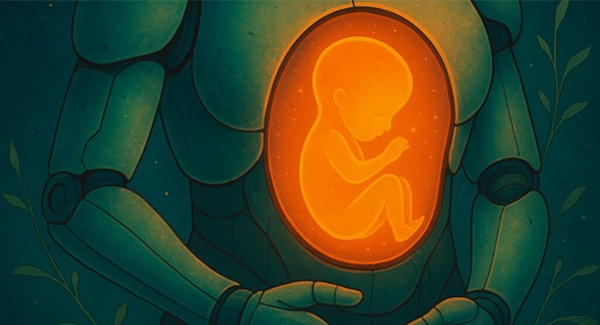Whether it’s the most wonderful experience of her life, a rather difficult time, or even a traumatic one, no woman will ever forget her pregnancy(s). I’m 46 now, and my own mother still remembers exactly how “unbearable!” supermarkets smelled for her during that time, “how beautiful” her skin suddenly felt, and how she felt me for the first time.
Now imagine that your biological baby isn’t growing in your belly – but in a robot. A strange idea?
Chinese start-up develops robot with uterus
The company Kaiwa Technology is developing the world’s first pregnancy robot. It will be able to fertilize eggs, carry the baby in an artificial womb – and even give birth! The humanoid (an object that resembles a human in shape, structure, or behavior) will likely cost around 13,000 euros. 13,000 euros! Doesn’t that sound incredibly cheap? To be honest, I would have expected millions.
The “breeding machine” has a “father” in Dr. Zhang Qifeng. He clarifies that the artificial womb’s technology is indeed sufficiently sophisticated already. Researchers have successfully kept newborn lambs alive for a few weeks in a “biobag” – a type of plastic bag filled with amniotic fluid – in earlier artificial womb trials. The animals developed wool, grew, and put on weight.
So far, so good: Now, all that’s left is to insert the uterus into the robot. That’s where the difficulty lies at the moment.
One idea being pursued – and perhaps one of the most disturbing aspects of this development – is that a real man would sleep with the robot and thus impregnate it. Unfortunately, I haven’t been able to find out whether romantic music will play and candles will be lit… But joking aside:
Is robot pregnancy a great opportunity or morally reprehensible?
Of course, such science-fiction-like news divides people. Many are shocked and call it an ethical nightmare. They ask themselves: Where does the bond with the mother become? And how are eggs supposed to be retrieved if women are infertile? Is it permissible to meddle with nature like this?
Others, however, also see this as a great opportunity: women who are not in good health could be spared the physical strain of pregnancy – and, on a much bigger issue: the robot could be a new option for couples who long for a child.
It is no coincidence that research in this direction is being conducted in China: the number of infertile couples there has risen sharply in recent years – from 11.9 percent (2007) to 18 percent (2020).And now, hand on heart, moms: Would you let a robot carry your baby – or is that absolutely unimaginable for you?


